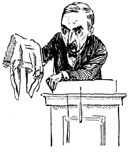
The Silent Pulpits of Churchianity
THE MEANS HAVE BECOME THE END
The current pastoral strategy in many American Catholic parishes is puzzling. With much of American society mired in moral relativism and confusion, subject to aggressive legal and cultural efforts to undermine any semblance of traditional moral values, many of our pulpits are silent. Let us charitably assume that there is a method to the pastoral madness of passivity in the face of moral chaos. By doing so, we can evaluate the current pastoral strategy of not challenging the culture, and determine whether this non-challenging strategy is prudent and theologically sound.
The non-confrontational pastoral strategy at issue has several concrete manifestations. For one, there is no catechizing in the typical Sunday homily. The liturgical directive in the Catholic Church to use the homily to comment on the Scripture readings is no barrier to catechesis. Catechesis finds its roots and a rich framework in Scripture. Thus, the need to comment on the day’s appointed readings is no excuse for failing to restate culturally challenging Catholic beliefs concerning the Eucharistic presence, abortion, contraception, divorce, fornication, homosexuality, mortal sin, the real possibility of damnation, and the need for confession. The Scriptures are full of passages that directly and/or indirectly relate to these Catholic beliefs. There is no liturgical excuse for failure to emphasize these Catholic beliefs.
Another excuse for not raising such subjects is the assumption that the congregation already knows the Catholic position. Well, if this is true, how is it that American bishops recently found it necessary to make a major effort to reaffirm the Catholic doctrine of the Eucharistic presence? Why do many parishioners receive Communion, but rarely, if ever, go to sacramental Confession? Why are all the mortal sins of sexual disorder ranging from fornication to abortion treated as venial non-issues? The evidence of the past thirty years is that many who identify themselves as Catholic do not understand Church teaching. But as canon law itself states, the faithful have a right to hear the truth.
Not too long ago, a writer for The Wall Street Journal noted how his non-Catholic friends wrongly assumed that Catholics were subject to weekly lectures on contraception and abortion. Personally, I can count on one hand any such instances. If this silence in many parishes isn’t problematic enough, many so-called Catholic universities and colleges — although not as many as in the recent past– make the failure to emphasize distinctive Catholic beliefs an affirmative duty and point of honor.
You May Also Enjoy
France is seeing its largest, most prolonged public demonstrations of the past several decades; millions are protesting same-sex marriage and adoption.
Playing Devil's Advocate... Novel Theology, Troubling Applications... Our Increasing Tolerance of Increasing Tolerance... Why AUL Opposed State Personhood Amendments... Notre Dame's Full Nudal Affrontery... Update on the ND88... and more
The Church advises caution about using spiritual, meditative, or mystical practices that are devoid of a distinctly Christian context.

